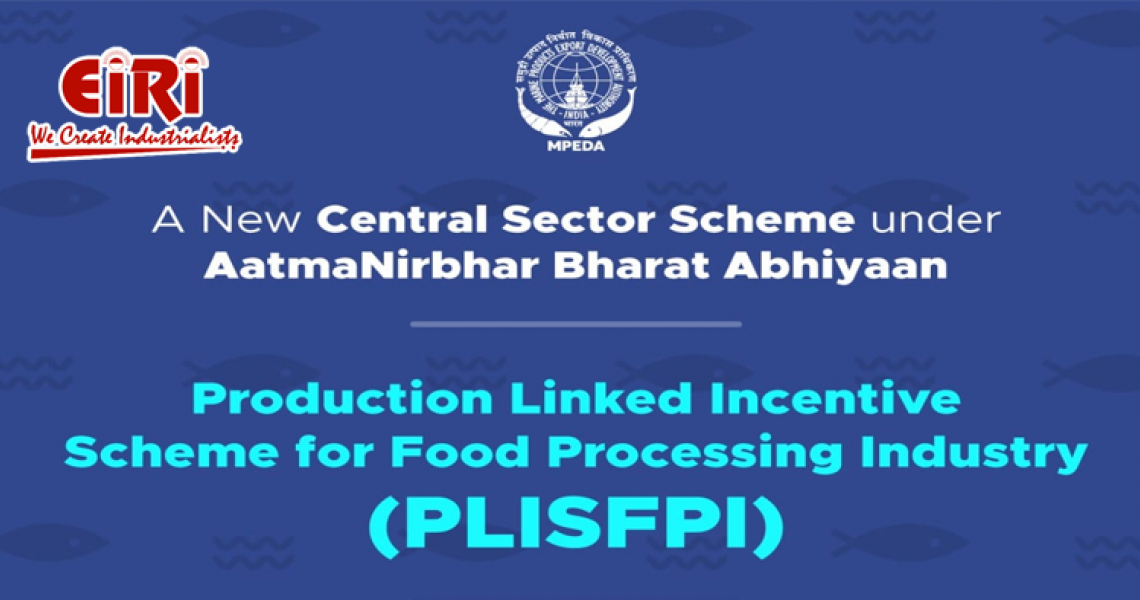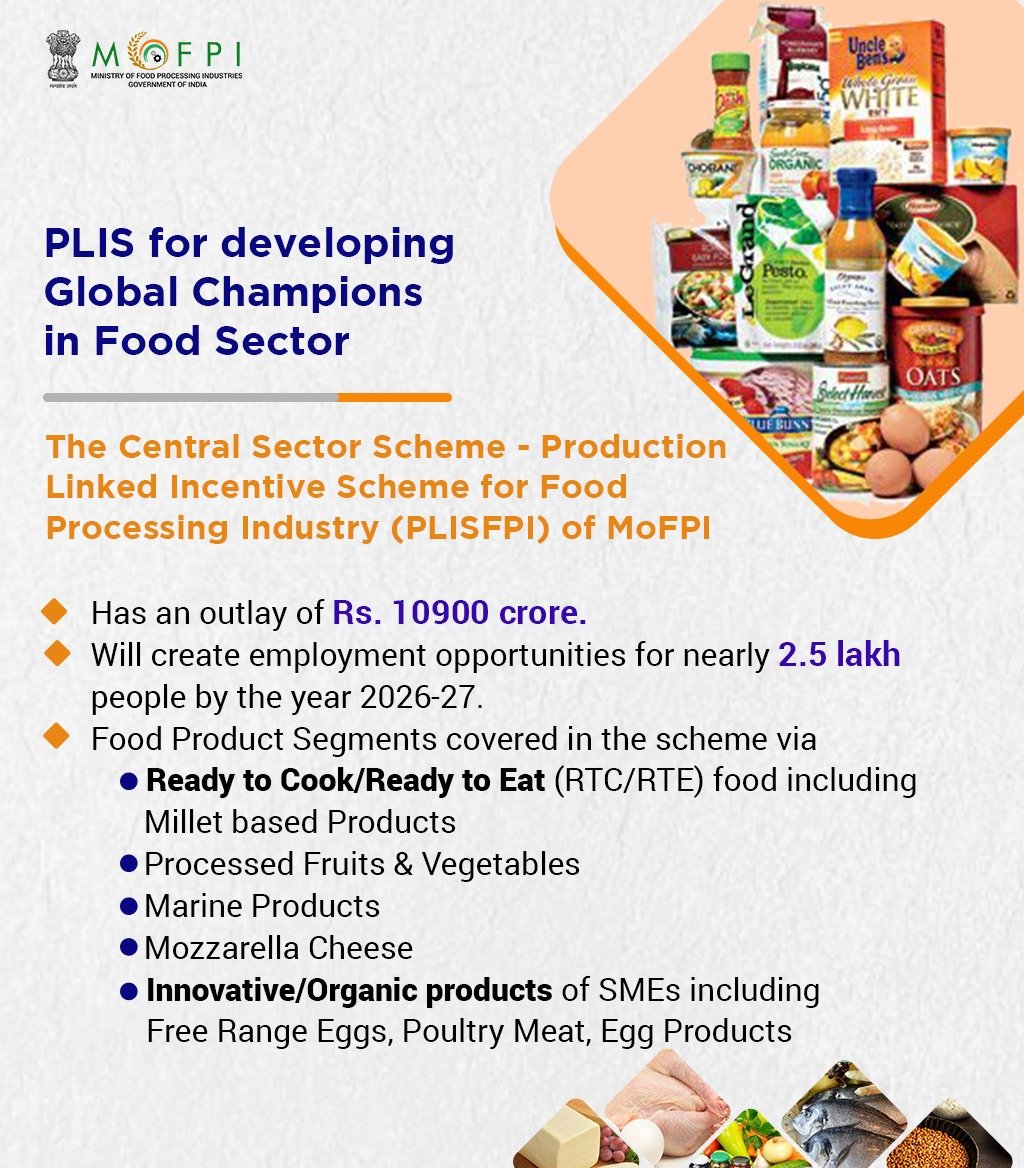What is PLISFPI (Production Linked Incentive Scheme for Food Processing Industry)

In a nation renowned for its diverse culinary heritage, the food processing industry plays a pivotal role. Recognizing the sector's potential, the Indian government unveiled the Production Linked Incentive Scheme for Food Processing Industry (PLISFPI) with an aim to catalyze growth, encourage innovation, and enhance India's presence in the global food market. With an outlay of Rs. 10,900 crore, this central sector scheme, approved by the Cabinet, represents a strategic step towards building a robust and competitive food processing sector in the country.
Background and Objectives
The food processing industry in India covers a broad spectrum of manufacturing enterprises, from micro to large-scale industries. With its resource endowment, large domestic market, and potential for value-added products, India has a competitive edge in this sector. However, realizing the full potential demands enhancing competitiveness in terms of scale, productivity, value addition, and global value chain integration.
The objectives of the PLISFPI are multifaceted:
- Global Food Champions: The scheme envisions supporting the emergence of global food manufacturing champions from India. By incentivizing manufacturing and expansion of processing capacity, the scheme aims to foster the growth of companies that can stand as international contenders.
- Indian Brands on the Global Stage: The scheme aims to strengthen select Indian food brands and facilitate their wider acceptance in international markets. This includes support for branding, marketing, and in-store visibility abroad.
- Employment Opportunities: The scheme seeks to create employment opportunities beyond traditional farm jobs by generating off-farm employment in the food processing sector.
- Farm Income Enhancement: By promoting value addition and facilitating higher income for farmers through remunerative prices, the scheme contributes to improving rural livelihoods.
Salient Features and Components
The PLISFPI comprises several salient features and components that collectively drive its impact:
- Financial Outlay: With a budget of Rs. 10,900 crore, the scheme sets the stage for substantial investment in the food processing industry.
- Food Product Segments: The scheme focuses on incentivizing manufacturing in key food product segments: Ready to Cook/Ready to Eat (RTC/RTE) foods including Millets-based products, Processed Fruits & Vegetables, Marine Products, and Mozzarella Cheese. Moreover, SMEs specializing in innovative and organic products, including Free Range Eggs, Poultry Meat, and Egg Products, are also eligible.
- Investment Incentives: Selected applicants are required to make stipulated investments in plant and machinery within the first two years. Investment made in preceding years may also count towards the mandated investment.
- Branding and Marketing Support: The scheme promotes Indian brands abroad through grants for in-store branding, shelf space renting, and marketing initiatives. This ensures that Indian products gain visibility and recognition in global markets.
- Implementation Period: The scheme operates over a six-year span, from 2021-22 to 2026-27, providing a sustained platform for growth.
- Employment Generation: By fostering expansion of processing capacity, the scheme is projected to generate processed food output worth Rs. 33,494 crore and provide employment for nearly 2.5 lakh individuals by 2026-27.
Implementation Mechanisms and Oversight
The implementation of the PLISFPI involves multiple layers of oversight and administration:
- Project Management Agency (PMA): The scheme's execution is carried out through a designated PMA, responsible for assessing applications, verifying eligibility, and scrutinizing claims for disbursement of incentives.
- Monitoring and Evaluation: The Empowered Group of Secretaries, chaired by the Cabinet Secretary, oversees the scheme's progress at the central level. An Inter-Ministerial Approval Committee (IMAC) is tasked with approving applicants, sanctioning funds, and ensuring smooth implementation.
- Annual Action Plan: The Ministry prepares an Annual Action Plan that outlines various activities for implementing the scheme effectively.
- Third-Party Evaluation: To maintain transparency and effectiveness, a third-party evaluation and mid-term review mechanism are integrated into the scheme.
Anticipated Impact and Beyond
The PLISFPI's significance reverberates through its projected impact:
- Economic Growth: The scheme injects substantial investment into the food processing sector, driving economic growth and contributing to India's Gross Domestic Product (GDP).
- Employment Opportunities: The expansion of processing capacity is set to create a significant number of off-farm jobs, improving employment prospects, particularly in rural areas.
- Brand Building: By supporting Indian brands' visibility abroad, the scheme enables them to compete on a global scale, enhancing India's reputation as a producer of quality food products.
- Farmers' Prosperity: The scheme's focus on higher remunerative prices for farm produce uplifts farmers' income, improving their livelihoods and economic well-being.
- Sustainability: The scheme encourages innovation, organic products, and the production of millet-based goods, aligning with sustainability goals.
In Conclusion
The Production Linked Incentive Scheme for Food Processing Industry (PLISFPI) marks a significant stride towards nurturing India's food processing sector into a global force. With its dual focus on enhancing manufacturing capacity and promoting Indian brands internationally, the scheme ushers in a new era of growth, innovation, and economic transformation in the food processing industry. As the scheme unfolds over its six-year span, it holds the potential to not only catalyze economic development but also create a lasting impact on farmers, entrepreneurs, and consumers alike, shaping India's journey towards becoming a global hub for food manufacturing excellence.

The PLISFPI not only presents a financial boost to eligible entities but also encapsulates the essence of India's vision for self-reliance, job creation, and sustainable development. By incentivizing investment, fostering brand recognition on the global stage, and fortifying the food processing ecosystem, this scheme sets the stage for a robust and resilient sector that aligns with international standards.
As we embark on this transformative journey, it's imperative to recognize that the success of the PLISFPI is not just measured in terms of economic numbers, but in the stories of individuals whose lives are positively impacted. Farmers witnessing higher income, entrepreneurs realizing their dreams, and consumers enjoying quality products - all stand as testimonials to the far-reaching consequences of this forward-thinking initiative.
The Production Linked Incentive Scheme for Food Processing Industry is more than a policy; it's a testament to India's commitment to shaping a dynamic, competitive, and inclusive food processing landscape. With each investment, each new brand established, and each job created, we inch closer to realizing the vision of a self-sufficient, globally recognized food processing industry that contributes to India's growth narrative and holds its head high on the world stage.










